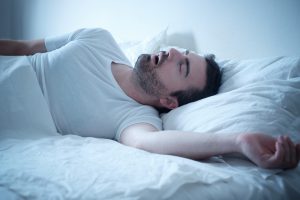 Snoring is annoying but relatively harmless, right? For many, it is, but for some, snoring is a symptom of obstructive sleep apnoea, a dangerous and potentially life-threatening condition in which the sleeper briefly stops breathing.
Snoring is annoying but relatively harmless, right? For many, it is, but for some, snoring is a symptom of obstructive sleep apnoea, a dangerous and potentially life-threatening condition in which the sleeper briefly stops breathing.
What is sleep apnoea?
Sleep apnoea affects approximately one in every five adults, and is more common in men than women. Sufferers of sleep apnoea briefly stop breathing while sleeping as often as thirty times per hour or more throughout the night. These episodes disrupt sleep, even if the sufferer doesn’t actually wake up. This can make sleep apnoea difficult to identify, particularly in single people who may not have a partner to notice the snoring.
Obstructive sleep apnoea occurs when the muscles that hold the airways open during sleep weaken, allowing the airways to close. After a few seconds, the sleeper struggles to breathe, resulting in a characteristic loud and sudden snore. If your partner has complained about your snoring and you’re unexplainably tired during the day, there’s a good chance your snoring is more than just an annoyance.
Complications of sleep apnoea
If you suffer from sleep apnoea, you may experience fatigue, even when you think you’ve had a full night of sleep. The frequent disruptions in sleep can leave you just as sleep deprived as if you laid awake tossing and turning all night, and can impair your ability to drive or operate machinery safely, and can even exacerbate or increase your risk of certain other health conditions, including:
- High blood pressure
- Cardiovascular disease
- Type 2 diabetes
- Obesity
- Chronic respiratory conditions
- Acid reflux
- Memory loss and confusion
Treating sleep apnoea
There are two frontline proven treatment options for sleep apnoea: CPAP (Continuous Positive Airway Pressure) machines and oral appliances. A CPAP machine is the most effective treatment for people with severe sleep apnoea. However, patients often find it constrictive and cumbersome, particularly when travelling. Unfortunately, these complaints lead to inconsistent use or even abandonment of the machine altogether.
Oral appliances are indicated for people with milder forms of sleep apnoea. It’s also indicated for use in certain patients with severe sleep apnoea if they can’t tolerate CPAP machines. According to the Australian Dental Association information sheet and based on extensive research studies…”95% of people will have an improvement in the level of their snoring when using an oral appliance.”
Surgery is a last resort treatment for sleep apnoea as the side effects can be significant. There are also countless numbers of unproven ineffective devices being advertised on the internet. They do not work and are not recommended for use.
For many sleep apnoea sufferers, an oral appliance is a comfortable and effective way to keep the airway open, reducing or eliminating apnoea episodes and reducing the risk of many serious health conditions. If your partner has complained about your excessive snoring, or if you experience unexplained daytime drowsiness, find out if an oral appliance can help you (and your partner) get a better night’s sleep. Please call Westside Dentistry to arrange an appointment on 07 3278 0580 now.

Comments are closed.